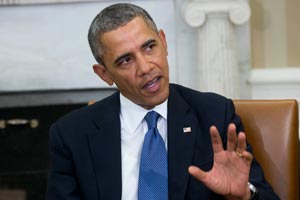Obama Budget Request Includes 6-Year, $18 Billion Freight Plan

This story appears in the Feb. 9 print edition of Transport Topics.
The fiscal 2016 White House budget request released last week anchors its transportation segment with a six-year, $478.26 billion surface transportation plan that includes an $18 billion freight program.
Dubbed the National Export Initiative, the freight proposal issued by the Obama administration would fund regional multimodal projects to alleviate highway congestion.
The overall budget, released Feb. 2, calls for $4 trillion in spending for the 12 months starting Oct. 1.
“Our budget proposal lays the foundation for a future where our transportation infrastructure meets the demands of a growing population and an economy that depends on the free flow of freight,” Transportation Secretary Anthony Foxx said in a statement on posted on the department’s website.
However, the proposal was immediately rebuked by GOP leaders in Congress. Republican opposition to tax increases hurts the request’s chances of passing in the House and Senate. Paul Ryan (R-Wis.), chairman of the tax-writing House Ways and Means Committee, said in a statement, the budget is “simply more of the same.”
“The American people are working harder than ever to get ahead, and this administration wants to put up yet another roadblock: $2.1 trillion in new taxes. And despite this massive tax hike, the president’s budget never balances, adding $8.5 trillion in more debt. This is simply unacceptable,” Ryan said.
The surface transportation plan to replace the MAP-21 law from 2012, which has been extended with legislative patches, still is called the Grow America Act, as was last year’s proposal that called for $302.3 billion in spending over four years.
Per year, the increase is 5.47% to $79.71 billion a year from $75.58 billion under last year’s version.
In a Feb. 3 news conference, Assistant Secretary of Transportation Gregory Winfree told reporters the new proposal “represents a return to rational thinking.”
Winfree, who works on research and technology for the department, added the administration wants to “stimulate a conversation away from short-term funding” so state governments can plan with greater certainty.
The request also would provide $7.5 billion for highway safety programs, $1 billion for loans for regional and national projects, and $1.25 billion annually for Transportation Investment Generating Economic Recovery infrastructure grants. The TIGER program assists cities and states with modernizing big-ticket projects. Last year, the program received $500 million.
Overall, the Department of Transportation’s annual budget would receive $94.7 billion in 2016, up from $72.6 billion this fiscal year.
The administration’s request provides $669 million for the Federal Motor Carrier Safety Administration, which is $84 million over last year’s enacted level. The request includes $284 million to assist states and municipalities with safety programs, $34 million for the commercial driver license program and $10 million for other safety initiatives.
The new Grow America rolls in spending increases at a rate of 6.9% a year, on average, through fiscal 2021, the plan’s last year. Spending for the Federal Transit Administration would grow most rapidly, 10.7% a year, whereas Federal Highway’s average increase would be 4.83% a year. It would be financed with revenue from a one-time, 14% tax on earnings that U.S. corporations have kept overseas, a process known as “repatriation.”
Under the proposal, the Highway Trust Fund account would get more than $40 billion in fiscal 2016 from the tax proposal and nearly $40 billion from traditional fuel taxes on diesel and gasoline. The trust fund, used to support state projects, would be renamed the Transportation Trust Fund to account for grant and safety programs, rail and transit spending.
Around the industry, key transportation groups approved of the administration’s efforts. American Association of State Highway and Transportation Officials Executive Director Bud Wright said President Obama had exhibited “leadership that has set the stage for a serious discussion about the next surface transportation bill.”
Marcia Hale, president of the infrastructure advocate Building America’s Future in Washington, added that the president “reaffirmed his clear commitment to updating America’s outdated transportation networks and aging highways and bridges.”
The 50% increase in time for Grow America to six years was applauded by Darrin Roth, American Trucking Associations vice president of highway policy, who said several recent plans have been five or six years in length. However, he said the new plan is very similar to the previous proposal.
“This is basically a rehashing of last year’s numbers,” said Roth, who criticized the heavy reliance on general fund revenue compared with dedicated funding from transportation user fees.
He added ATA was displeased that transit funding accelerates much faster than highway funding under Grow America. Roth also said that while presidential budget proposals are never enacted into law in their entirety, “hopefully this is a starting point for negotiations.”

